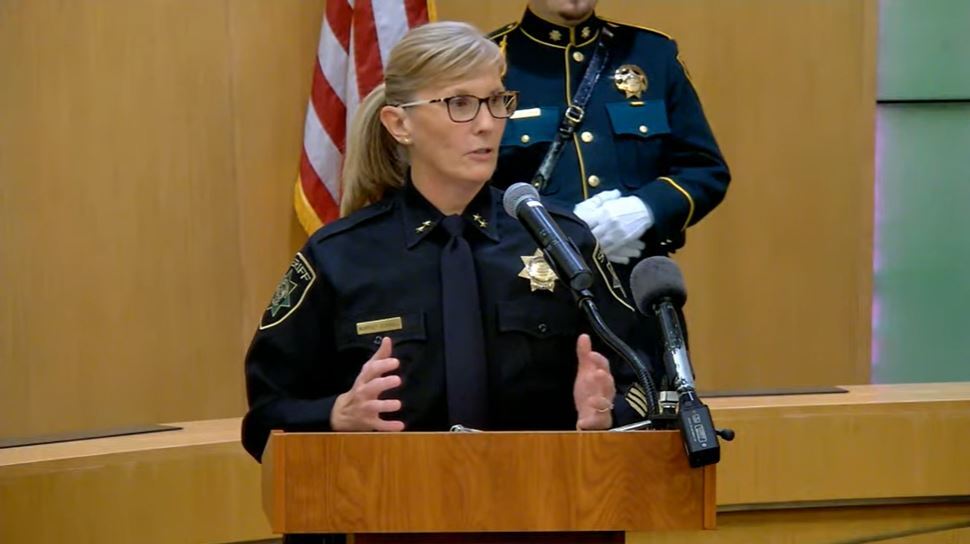
FILE: Nicole Morrisey O’Donnell at her swearing-in ceremony on January 4, 2023. In a statement released Tuesday, Sheriff Nicole Morrisey O’Donnell said she will not use county jails to penalize people for not having a home.
Jeff Thompson / OPB
Dear Reader,
For more than 100 years, OPB has offered reliable news and connection. Through wildfires, elections and economic downturns, OPB has been there to inform and connect our communities. Today, journalism faces new obstacles.
But this work is only possible because of people like you — readers who turn to articles like this and continue to engage with independent journalism in our community. If OPB has been a part of your life, if it has helped you see your community or the world more clearly, please consider making a contribution today.
— The OPB Team
Please select an amount to give. Your contribution ensures that fact-based reporting, cultural connection, and stories that strengthen our community remain freely available to everyone.
Portland has hit an unlikely obstacle to its new policy restricting where unhoused people can camp: the Multnomah County Sheriff’s Office.
In a statement released Tuesday, Sheriff Nicole Morrisey O’Donnell said she will not use county jails to penalize people for not having a home.
“As the elected official charged with managing the jail, I believe we need to utilize the corrections system as a place for people who pose a genuine danger to the public, and that does not include individuals whose only offense is living unsheltered,” wrote Morrisey O’Donnell. “Arresting and booking our way out of the housing crisis is not a constructive solution.”
On Friday, Portland Police officers made their first arrest under a new city ordinance that limits where people can camp in public. The arrest was first reported by Willamette Week. Under the city policy, if a person violating the rule refuses to accept shelter, they can face arrest or a fine. According to police, an unhoused man living in Northeast Portland said “he would rather be arrested” than go into a shelter. Officers arrested him and brought him to Multnomah County Detention Center.
Yet county deputies responsible for booking suspects in the county jail refused to process the man. The booking process includes collecting personal information from a suspect and taking their fingerprints and mugshot, effectively creating a record of their arrest in the county’s criminal justice system.
Morrisey O’Donnell, who was first elected to a four-year term in 2022, said the reason for refusal is both ideological and technical.
“Incarceration is a costly, short-term measure that fails to address the complex underlying issues,” she said in her written statement Tuesday.
She also said that the city never contacted her office to request that the new camping ordinance be included as a “bookable offense” with the county. This step is required because, under state law, Multnomah County isn’t expected to book or jail people for violating city ordinances, only felony or misdemeanor offenses.
According to Deputy John Plock, a spokesperson for the sheriff’s office, there is currently no one being held in the county jail for violating a city ordinance. Plock said the county occasionally makes “temporary exemptions” to this rule in order to address certain public safety issues. But those exemptions must be made through an agreement between the city and the sheriff’s office.
“No one from the mayor’s office or city attempted to seek an agreement for an exemption for this ordinance,” Plock said.
Mayor Ted Wheeler, who spearheaded the camping ordinance, doesn’t believe this agreement is necessary.
“Cities do not typically need to get agreements in writing confirming that their Sheriff will enforce the law,” wrote Cody Bowman, a spokesperson for the mayor’s office, in an email to OPB.
In a statement, Wheeler said that his office has met with the sheriff’s office several times over the last year and a half to collect input on the camping ordinance.
“I am disappointed by the Sheriff’s decision to refuse to book individuals arrested for violating the law,” Wheeler said.
The city intends to continue arresting people, if necessary, under the new policy. Morrisey O’Donnell, for her part, said she will continue to direct her deputies not to book anyone arrested under the ordinance.
This doesn’t mean that the charges are dropped — it simply means that person won’t go to jail after the arrest. Their citation, issued by a police officer, comes with a court date. At that hearing, a prosecutor can decide whether or not to pursue charges.
This story may be updated.



